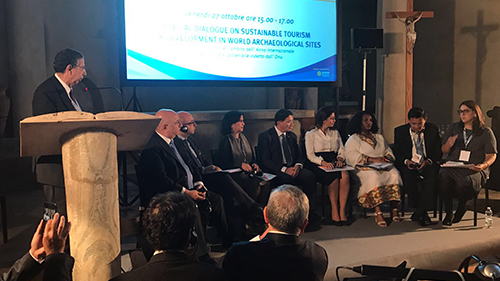Contact Center
.
28 October 2017
H.E Shaikha Mai at the Mediterranean Exchange of Archaeological Tourism Meeting


H.E Shaikha Mai Bint Mohammad Al-Khalifa, President of Bahrain’s Authority for Culture & Antiquities and Special Ambassador for Sustainable Tourism for Development 2017, has taken part in the 20th edition of the Mediterranean Exchange of Archaeological Tourism, held the ancient city of Paestum, UNESCO site since 1998, from October 26th to 29th, 2017.
Invited by World Tourism Organization (UNWTO) to speak about one of the
of the highlights of the on ''Sustainable Tourism for the Development of World Archaeological Sites'', H.E said “ This International meeting event is a good opportunity for everyone to take advantage of in order to exchange experiences, knowledge and expertise and learn from others. Culture has a permanent contribution in enhancing the development of local communities and make their lives better”.
H.E Shaikha Mai has highlighted, during her speech, the strenuous efforts deployed by BACA to create a convenient cultural infrastructure for an appropriate sustainable cultural tourism industry. H.E gave the example of Pearling: Testimony of an Island Economy, a UNESCO World Heritage List site, which will certainly add more bright colours to the city and to the region when it will be completed by 2018, a significant year celebrating Muharraq also as the Capital of Islamic Culture, a citadel of the world. H.E also said that Bahrain gives great importance to the World heritage cultural sites given their role in spreading knowledge and exchange of intellectual and cultural ideas between peoples and civilizations.
H.E added saying “ The real identity of any country is its cultural identity, which characterizes its people; we are keen in Bahrain to develop the historical sites that add more value to the surrounding environment and offer profitable economic returns to the local community.
The special session, monitored and coordinated by Dr. Mounir Bouchenaki, former director of the Arab Regional Centre for World Heritage (ARC-WH), shed light on the role of sustainable tourism in the protection of archaeological sites and encouraging the management of these sites effectively. It also dealt with finding best ways and means to develop the competences of the supervisors and persons –in- charge of these sites, and how to enhance the civil society’s role and participation in the preservation and protection efforts. UNWTO Secretary General Taleb Rifai, has taken part in this meeting, along H.E Shaikha Mai Bint Mohammad Al-Khalifa, H.E Princess Dana Fras from Jordan, Italian ministers and high officials, as well as the heads of UNESCO sites in Cambodia, Ethiopia, Jordan, Italy and Peru.
The Mediterranean Exchange of Archaeological Tourism confirms itself as an unique international event: home of the only exhibition hall in the world dedicated to archaeological heritage and to ArchaeoVirtual, the first international event dedicated to multimedia, interactive and virtual technologies; place for the study and debate on cultural heritage and tourism issues; meeting place for professional business, touristic and cultural operators and for travelers; business opportunity inside the inspiring location of the Archaeological Museum with the Workshop between foreign buyers and cultural and archaeological tourism offer. Worth to mention that H.E Mai Bint Mohammad Al-Khalifa was awarded in 2013 Paestum Archaeology Award, in the presence of renowned diplomatic and cultural figures, for efforts to preserve the Kingdom of Bahrain’s heritage and in recognition for H.E’s constant preoccupation to serve and advocate culture as a universal humane communication tool between different races and peoples of the globe.
Worth to mention also that the Mediterranean Exchange of Archaeological Tourism is a successful format, as testified by the collaboration of international organizations such as UNESCO, UNWTO and ICCROM, but also by 10.000 visitors, 120 exhibitors with 30 foreign Countries, 70 conferences and meetings, 300 speakers, 120 offer operators, 100 journalists. Among the issues to be looked at in Paestum will be underwater tourism, which is seeing a surge in popularity even in Italy's Campania region, such as at the Underwater Archaeological Park of Baia. Paestum and Velia are UNESCO sites since 1998, because the Cilento presents an outstanding cultural landscape. The dramatic groups of sanctuaries and settlements along its three east–west mountain ridges vividly portray the area's historical evolution: it was a major route not only for trade, but also for cultural and political interaction during the prehistoric and medieval periods. The Cilento was also the boundary between the Greek colonies of Magna Graecia and the indigenous Etruscan and Lucanian peoples. The remains of two major cities from classical times, Paestum and Velia, can be found there.







